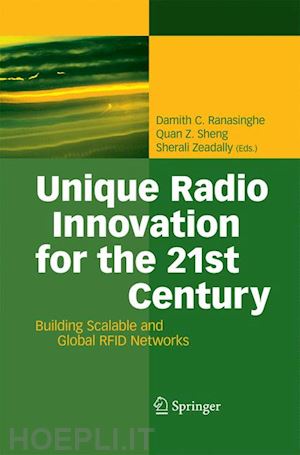
Questo prodotto usufruisce delle SPEDIZIONI GRATIS
selezionando l'opzione Corriere Veloce in fase di ordine.
Pagabile anche con Carta della cultura giovani e del merito, 18App Bonus Cultura e Carta del Docente
1. RFID data management.- Database integration.- Speed issues in data movement.- Data stream management.- Efficient data storage and retrieval.- Managing uncertainty.- 2. Global RFID information architectures.- RFID middleware architecture.- RFID and sensor network integration architectures.- RFID data sharing architectures.- Integration with ERP, SCM and MRP.- SOA (Services oriented architecture).- Enterprise I.T. architecture and middleware touch points.- RFID network management.- COTS and Open Source RFID infrastructure.- Integration of RFID with other applications.- Security.- 3. Internet technologies and RFID:.- Web services and RFID.- RFID and semantic Web.- 4. RFID applications.- (Inventory Management, Asset Management, Retail, Manufacturing, Supply Chain, Pharmaceuticals, Healthcare/Medicine/Biotech/Biology, Aerospace / Airlines / Airport and baggage management, Automotive, Shipbuilding, Entertainment/Media, Financial / Mobile Payments).- Business versus consumer applications.- Business process redesign and RFID.- Innovative RFID-enabled applications.- RFID case studies and field trials of RFID applications.- Commercial experience with RFID.- Security and access.- 5. Business Issues:.- ROI analysis at unit and enterprise levels.- Revenue models in RFID services.- Effect of RFID on process improvement for the enterprise.- Impact on the CIO/I.T. office.- Legal issues in RFID.
Dr. Damith Ranasinghe received a BE in Information Technology and TelecommunicationEngineering from The University of Adelaide with first class honours, in 2002. Since graduation he has worked in Auto-ID Labs at MIT, USA, Cambridge University, UK and The University of Adelaide, where he completed his PhD degree in Electrical and Electronic Engineering in 2007. Damith is currently leading research at the Adelaide Auto-ID Lab where he is the Associate Director of the laboratory. His current research interests are focused in the areas of RFID technology, systems architecture, and integration, in particular, the areas of lightweight cryptography for low cost RFID systems, and integration of RFID and sensor technology.
Dr. Michael Sheng is currently an assistant professor in the School of Computer Science at the University of Adelaide. Sheng holds a PhD degree in computer science from the University ofNew South Wales (UNSW) and did his post-doc as a research scientist at CSIRO ICT Centre. Hismain research interests include Web services, service-orientedarchitecture, RFID, sensor networks, and pervasive computing. Dr. Sheng is the founding chair of the International Workshop on RFID Technology.
Dr. Michael Sheng has edited four books and published more than 50 refereed technical papers in premier international journals and conferences including VLDB Journal, IEEE Internet Computing, Communications of the ACM, VLDB, WWW, ICDE, and ICSE. Dr Sheng is the recipient of the Microsoft Research Fellowship (2003-2004) and CSC Fellowship (1999-2000). He is a member of the IEEE and the ACM.
Dr. Sherali Zeadally is currently an Associate Professor in the Department of Computer Science and Information Technology at the University of the District of Columbia in Washington DC, USA where he is the Founder of the UDC’s NEtwork Systems laboraTory (NEST). Dr. Sherali Zeadally is the Co-Editor-in-Chief of theInternational Journal of Internet Protocol. Technology, and he currently serves as Editor/Associate Editor/Editorial board member of 13 peerreviewed international journals (published by Springer, Elsevier Science, Academic Press, etc). To date, he has authored/co-authored over 120 refereed technical publications in books, journals, conference, and workshop proceedings. His recent RFID activities include RFID publications in IEEE Computer, IEEE Internet Computing, Journal of Information System Frontiers, Co-Chairing of the “International Workshop on RFID Technology: Concepts, Applications, Challenges” held in 2008 and 2009, Co-Guest editor of Special issues in various International journals (IJIPT, Information Systems Frontiers) on RFID. He is a Fellow of the British Computer Society (FBCS), UK, and a Fellow of the Institution of Engineer ing and Technology (FIET), UK.











Il sito utilizza cookie ed altri strumenti di tracciamento che raccolgono informazioni dal dispositivo dell’utente. Oltre ai cookie tecnici ed analitici aggregati, strettamente necessari per il funzionamento di questo sito web, previo consenso dell’utente possono essere installati cookie di profilazione e marketing e cookie dei social media. Cliccando su “Accetto tutti i cookie” saranno attivate tutte le categorie di cookie. Per accettare solo deterninate categorie di cookie, cliccare invece su “Impostazioni cookie”. Chiudendo il banner o continuando a navigare saranno installati solo cookie tecnici. Per maggiori dettagli, consultare la Cookie Policy.